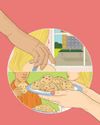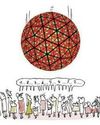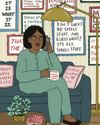Don’t let distress sideline you. Turn it into a strength instead.

WHEN ARMY SURGEON Rhonda Cornum regained consciousness after her helicopter crashed, she looked up to see five Iraqi soldiers pointing rifles at her. It was 1991, and her Black Hawk had been shot down over the Iraqi desert. Dazed from blood loss, with a busted knee, two broken arms, and a bullet in her shoulder, the then-36-year-old medic was subjected to a mock execution by her captors, sexually assaulted, and held prisoner for a week.
Her crisis included textbook causes for post-traumatic stress: a near-death experience, sexual assault, utter helplessness. And yet, after her release and medical rehabilitation, she surprised psychiatrists by focusing on ways she’d improved. “I became a better doctor, a better parent, a better commander, probably a better person,” she says.
Cornum’s experience is far from unique. The term post-traumatic growth, coined by psychologists Richard Tedeschi and Lawrence Calhoun of the University of North Carolina at Charlotte, describes the surprising benefits many survivors discover in the process of healing from a traumatic event. After counseling cancer survivors, the bereaved, the severely injured, veterans, and prisoners, the researchers found growth in five main areas: personal strength, relationships with others, perspective on life, appreciation of life, and spirituality.
この記事は Reader's Digest US の June 2019 版に掲載されています。
7 日間の Magzter GOLD 無料トライアルを開始して、何千もの厳選されたプレミアム ストーリー、9,000 以上の雑誌や新聞にアクセスしてください。
すでに購読者です ? サインイン
この記事は Reader's Digest US の June 2019 版に掲載されています。
7 日間の Magzter GOLD 無料トライアルを開始して、何千もの厳選されたプレミアム ストーリー、9,000 以上の雑誌や新聞にアクセスしてください。
すでに購読者です? サインイン

Cookies for Forgiveness
My blowup was half-baked. The apology wasn't

Puff the Magic Pastry
It always rises to the occasion

New Year's Traditions Around the World
1 MOST OF US spend the final seconds of each calendar year watching a nearly 12,000-pound geodesic sphere descend over Times Square in New York City.

Mom's Wall-Sign Wisdom
She never met a plaque or bumper sticker she didn't quote

Protect Your 'Holiday Heart'
This joyful time of year can also be dangerously stressful

Heroes of the Holidays
It's not just Santa Claus bringing the holiday magic this season. As you'll see, he's got elves all over.

The Man Who Looks After His Wife's Ex
For him and his bride, \"in sickness and in health\" meant something really special

How Risky Are Those Holiday Cocktails, Really?
The latest recommendations about drinking and your health

HOW ONE KENTUCKY TOWN SAVED ITSELF
Downtown Hazard had lost its small-town mojo to drugs. Former addicts are helping to bring it back.

Dream It, Do It, Done!
Your bucket-list goals, accomplished